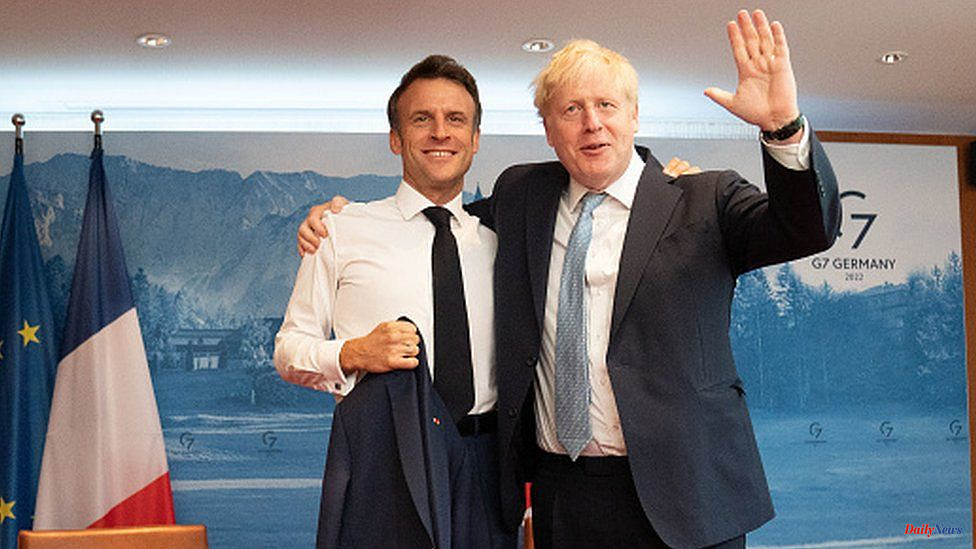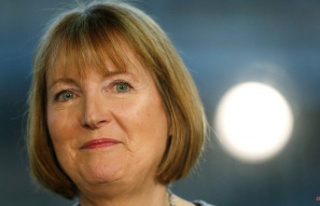European leaders are embracing the idea of a new club of political nations as they face the challenge of Western unity in Ukraine.
The French President Emmanuel Macron first proposed the idea of a new European Political Community.
It wouldn't be like other international groups such as the EU which is a political-economic union and Nato which is a security coalition.
Instead, Macron's new group would "offer an opportunity for political coordination" for EU countries and non-EU members.
Even the UK, after years of Brexit chaos, has been mentioned as a potential member. Prime Minister Boris Johnson expressed enthusiasm for the idea of a new Roman Empire.
Keep in mind that similar grand schemes have been attempted - and failed – in the past. What is different about this one?
In May, Macron made the first suggestion in a speech to the European Parliament.
He explained to the parliament that the new community would allow democratic countries to "find a space" for political cooperation on security, energy, and movement of people.
This framework would enable EU members and non-members to participate in international political decision-making.
Macron stated that the EU, due to its ambition and level of integration, is not the best way to structure Europe in the short-term.
As was the case with discussions at the meeting of EU leaders last Wednesday, his speech was not very detailed.
These leaders were part of the European Council that agreed to "address common interests" but not replace the EU and its decision-making power.
Last week, Ukraine was granted EU candidate status. This puts them on the path to becoming EU members.
This is just one step in a lengthy, difficult process that includes suitability checks, reforms, and tedious negotiations.
The European Political Community (in theory) could foster political relations between EU members and potential members.
Although EU leaders insist that this framework won't replace the process for allowing new members to join - so-called "enlargement", Mr Macron said that joining the bloc was a "long journey".
He also warned about "enlargement fatigue" among members. He suggested that a European Political Community might be the best way to stabilize our neighborhood.
Any country can be considered, provided they adhere to the EU's democratic values, as Mr Macron stated.
This could include countries that want to join the EU, such as Ukraine, Moldova and Georgia.
Other countries, including Switzerland and single market members Norway, Iceland, and Liechtenstein that have strong economic ties with the EU may also be interested in joining.
A potential participant has been also named by Turkey, a long-standing EU aspirant and member of NATO.
There's also the UK, which, despite the friction over its exit from the EU has closely cooperated with European leaders during Ukraine's crisis.
The "le bromance", as Johnson called it, was evident when President Macron met him at the G7 summit in Germany last Wednesday.
Arm in arm, Mr Macron & Mr Johnson were pictured putting aside their differences over Brexit for talks focusing on the war in Ukraine.
The European Political Community was another item on the agenda. Mr Macron stated that the UK prime minister had shown an "interest" in it.
Johnson has since explained his "interest" more in detail.
On board a flight from London to Madrid for a Nato summit, Johnson spoke to reporters and said that he "actually claim paternity to this idea". This was something he suggested to foreign secretary when he became foreign minister in 2018.
The prime minister, however, presented his vision for a larger group that would include Turkey and North African countries as an alternative to Mr Macron's European Political Community.
Johnson compared his proposed grouping with the Roman Empire and said that "there has to be a place for all of that in a larger conversation about issues that impact all of us."
"Rather than building new structures, let's focus on building relationships."
It won't take a day to build a new Rome. And even if it could, not everyone will want it.
When Liz Truss, Foreign Secretary, was questioned by a committee made up of MPs, she rejected the suggestion that Britain had accepted the idea.
"So, you don't buy in to his political economic community?" Tom Tugendhat, Chairman of the Foreign Affairs Committee, asked.
"No," Ms Truss responded, insisting that the G7 and Nato were the UK's key military and economic alliances.
Charlotte Galpin, senior lecturer at the University of Birmingham in German and European politics, stated that there is little chance of meaningful UK engagement under this Conservative government.
"Objection against the idea of a European Political Community is at the core of Conservative Party Euroscepticism. The mere mention of the term is likely to elicit a visceral reaction among hard-line Eurosceptics."
This is a very early stage.
The world's leaders are collaborating on ideas and conversations about security cooperation seem more serious since Russia's invasion in Ukraine.
Matt Qvortrup, a professor in political science at Coventry University, said that historically, such political communities were established "when smaller democratic entities have feared a threat by a menacing force".
He stated that the EU was originally created to counter a threat from Soviet Union.
A senior diplomat recently told BBC that a forum was necessary: "There is not a meeting room where everyone from Iceland to Ukraine meets."
This type of proposal has been presented before, many times and under different guises.
In May's speech to the European Parliament, Macon mentioned a proposal by Francois Mitterrand, a former French President, for an "European Confederation".
The idea of Mr Mitterrand was first proposed in 1989 after the Soviet Union collapsed. It eventually failed to gain enough support from outside France.
This precedent is not good news for Macron, whose suggestion was met with scepticism.
Galpin stated that it was an intriguing idea in principle.
"In practice however, it would likely face similar problems to the EU - who is considered European enough to join? Will countries be able reach enough agreement on cooperative endeavors that lead to meaningful action?"
Given Johnson's support of Brexit, it would be "ironic" if Johnson joined the effort, Mr Qvortrup stated.
"But, as Cicero, the Roman statesman, once wrote, "Consistency in politics is not a great virtue."












